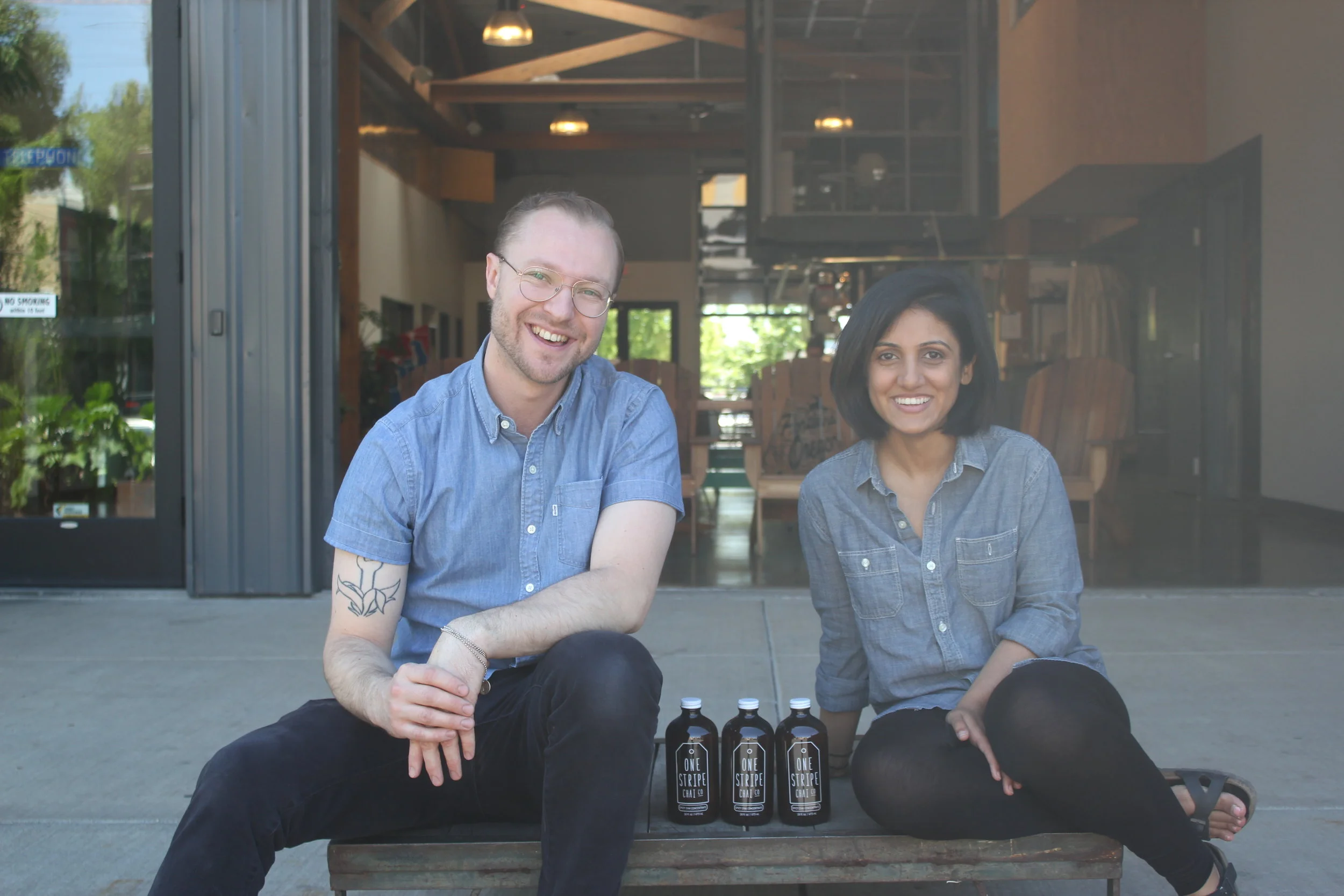by Sofie Sherman-Burton
There are a lot of different beverages that one can buy that say “chai” on the package: tea bags, tetra pack boxes, buckets of powder that come with their own plastic scoop, and bottles that say “chai tea latte.” As enjoyable as these can be in their own special ways, they only faintly resemble the chai that Farah Jesani, co-founder of One Stripe Chai, saw her parents drinking two times a day throughout her childhood or the chai her community was drinking at the mosque. These other beverages are often more watery, much sweeter, overly cinnamon-flavored, or a combo of all three of those traits.
“There was no good chai out there,” Farah cited as a motivation for the business she and co-founder Josh Weinburg founded in November 2015.
Farah and Josh met at TaborSpace, where Josh was managing the coffee shop and working on a chai concentrate recipe in the community space’s basement. “I thought that was going to be that. Then I met Farah.”
Farah had been working as an IT consultant in New York City but was ready to leave the city. “I was getting really into third wave coffee and really interested in why my latte was six dollars,” Farah said. “I left New York and came to Portland to learn about coffee. I happened to find via a Google search (of course) TaborSpace, where Josh was the manager.”
TaborSpace ran a volunteer barista program which meant that Farah could learn more about coffee without the real experience she would need to land a gig at another Portland coffee shop. While working at TaborSpace’s cafe, Farah spent a lot of time going to coffee shops around the city. “I once randomly ordered chai at a coffee shop that is really well known, and it was so disappointing. A lot of thoughts went through my mind - is this someone’s first foray into chai? It doesn’t taste like anything, you can’t taste the tea, it’s way too sweet, the barista doused it in nutmeg and now I know why - it tastes like nothing and is really watery.”
“In most chai products and recipes available in the United States, despite chai literally meaning tea, the actual tea leaves are often neglected. But with One Stripe Chai, the flavor of the tea manages to come through even amidst the strong spices in the brew, providing a more robust and tasty flavor experience.”
With that bad chai experience on her mind, Farah asked Josh what TaborSpace was using for chai. That’s when he told her about his chai experiments in TaborSpace’s basement kitchen. “I was very interested in coffee before that,” said Farah. “But as soon as we started to talk about chai, I was like, no, I don’t care about coffee; I have no relation to it from a cultural standpoint. But I do care how chai is represented.”
With a bevy of customers eager to be their guinea pigs, Farah and Josh spent the next six months perfecting the recipe for a chai with more kick. “While we were going back and forth, it was a lot of middle of the night emails to Josh: ‘Hey, I just had an epiphany: gotta up the cardamom.’” When they landed on a formula they were happy with, they started selling their concentrate to other coffee shops around Portland. Because Josh had trained so many baristas at TaborSpace, he had relationships all over town that helped them get their new business off the ground. “We had an extra little boost because I had trained so many baristas, there were a lot of baristas that knew what I was working on and they would come to me saying, ‘Our chai sucks. Can you get me a sample?” That helped them get ten accounts right off the bat, and soon customers in those coffee shops were asking where they could buy the chai themselves.
Unlike many other chai products, One Stripe is a concentrate that you mix in a one-to-one ratio with the milky beverage of your choice (I am unsurprisingly partial to Oatly) to make a cup of chai. Concentrates were unfamiliar to Farah. “Even my parents are like, ‘A concentrate? You can just make chai. Why would you make a concentrate?’” Farah says. “Josh explained the need for coffee shops - there’s no space for a stove, you’re not just able to brew up a whole thing of chai.” Having a concentrate means that coffee shops can easily use the steamer on their espresso machines to make a hot, foamy chai. It also means that the perfect fall beverage is just moments away when you’re making chai at home.
There are three major things that make One Stripe’s concentrate stand out. The first is the precise amount of sediment they leave in the bottle; it’s the reason the first two steps in their instructions to make the chai are the shake the bottle, and why the chai maintains its perfect level of spiciness.
The second is the organic tea that Farah and Josh that “went to the ends of the earth to find,” Josh said. The tea is processed using the Cut Tear Curl or CTC method (the same method used to make Lipton or PG Tips), which means that the tea is in a more granulated form that instantly releases color and flavor when it hits water. But finding a CTC tea that had a superior flavor and was certified organic was a challenge. Ultimately, Josh and Farah found Chota Tingrai tea gardens, a medium-sized, family-owned farm that Farah had the opportunity to visit this past winter. “One of the daughters got her masters at Berkeley in sustainability and she wanted to take that back to her family’s gardens. She is doing a lot of really great social efforts to get more women in management at the farm. All tea gardens in India are required to offer free education and housing for all the workers on the farm. She is bringing in her own extra teachers to teach English to all of the kids. They are doing a lot of cool things that we are interested in and want to support. Our customers also care about that.”
And thirdly, there is ten times more tea in the One Stripe formula than any other dry ingredient. In most chai products and recipes available in the United States, despite chai literally meaning tea, the actual tea leaves are often neglected. But with One Stripe Chai, the flavor of the tea manages to come through even amidst the strong spices in the brew, providing a more robust and tasty flavor experience.
As their business grew, Josh and Farah moved their operation to New Foods Kitchen, an all-vegan commissary kitchen in Ecotrust’s Redd building at SE 7th & Salmon, where many other products sold at People’s are made. You can now find One Stripe in many coffee shops around town, and in the tea section at People’s. One Stripe is shelf-stable and should be refrigerated once opened. You’d be hard pressed to find a more delicious, warming beverage as the weather cools down, but you can also get creative with how you use One Stripe, as evidenced by Farah’s granola recipe below.
Farah’s Granola
Ingredients:
1 cup rolled oats
1/8 cup maple syrup
1/8 cup coconut oil
1/8 cup slivered almonds
1/8 cup Dark chocolate chips
1/8 cup sunflower seeds
1/8 cup cashews
3 oz One Stripe chai concentrate
Preheat the oven to 250°. Combine oats and nuts in a bowl. Combine oil, maple syrup, and chai concentrate in a separate bowl. Add the wet ingredients to dry ingredients and mix thoroughly. Pour everything in a thin layer onto a cookie sheet and bake in the oven for about an hour. Stir the mixture around the pan every 15 minutes to cook evenly. Add in the raisins and dark chocolate chunks once you remove the granola from the oven and it has a chance to cool.


